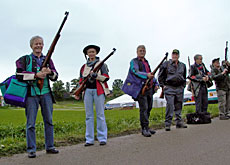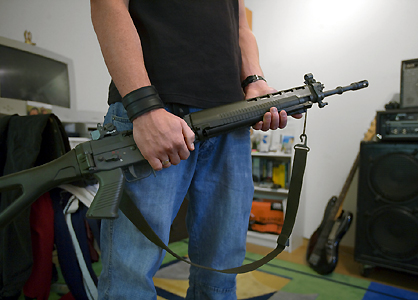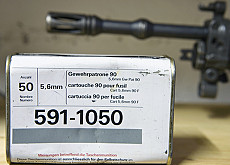Hands off my gun!

Guns have long been a fixture of life in Switzerland, with its militia army, strong traditions and liberal laws. Up to 20 million are kept in cellars and attics.
As the national gun debate hots up, swissinfo tests the temperature of opinion among gun fans with a visit to a gun dealer and stop-off at the “world’s biggest shooting festival”.
It’s 10am and the tiny premises of Poyet gun shop in the middle of the capital Bern are a hive of activity.
A distinguished-looking man in suit and tie is checking the price of a snub-nosed Smith & Wesson pistol – SFr680 ($558) – while three young Goths are scanning the displays of pistols, mace and knives: “That’s the kind of gun rappers carry,” one whispers.
The two-floor shop sells a range of rifles and handguns with “something for everyone”, from army-issue assault rifles to engraved Austrian shotguns.
Firearms are a commonly accepted part of Swiss life, but no one knows exactly how many exist in Switzerland. Estimates start at about two million – for a population of 7.5 million – but the owner Gaston Poyet thinks there are many more.
“I think 10-20 million is much more realistic. Most men who do military service have been able to keep their gun, and since 1840 onwards all the guns have been kept at home,” says Poyet, whose father opened the shop in 1952.
Good old days
Business was “very good” up to the mid-1990s before a sales slump and is only now slowly picking up, according to Poyet.
“During the best times we sold about five to six guns a day – now it’s about the same per week,” he explains. “There’s a definite downward trend, but we are in the city and that’s different from the countryside; people in the cities are more mobile and are more afraid to have guns at home.”
To compensate he now sells more accessories, air pistols and items for young people – “knives and pepper sprays”.
As to changes to Switzerland’s gun traditions, Poyet senses attacks from various sides.
“Young Swiss people think differently and don’t want guns at home,” he explains, adding that the European Union and the United Nations are also exerting considerable pressures to enforce tougher gun laws.
“Over the next 10-20 years this trend will get even stricter,” says Poyet, while adding that tighter gun laws will never stop criminal acts.
“The important thing today in our business is to follow the trends. It is important to be flexible.”
Sharpshooters
Half-an-hour’s drive from Bern the sound of gunfire echoes around the village of Wallenried, followed by general applause.
Ten men lying in a row dressed in civvies look up from their assault rifles at the camouflage targets on the hillside.
We have a winner in the 300-metre discipline – 47-year-old Romain Bourqui punches the air in delight with his score of 71 out of 72.
Every year some 150,000 people take part in the three-day national target-shooting competition – advertised as “the biggest shooting festival in the world” – at 650 shooting clubs and open-air events like the one in Wallenried.
The tradition, which dates back to the 19th century and which was initially seen as a way of fostering national solidarity, now attracts a mixture of hardcore shooting fans and those just there to party.
“The pillar of the festival is shooting, but people also come to discuss and to be together,” explains the president of the local shooting association, Hans Etter.
Popular national sport
Shooting clubs remain popular in Switzerland, especially among the older generation, with around 74,000 licensed members. But with debate raging over gun ownership, they constantly have to reaffirm shooting’s role as a popular national sport.
“We are peaceful people,” said Rita Fuhrer, president of the national shooting association. “There are no excesses like with other sports.”
For Frank Lambelet, president of the La Perrause shooting club, it’s a constant battle to maintain the purity of the sport: “People prefer to talk about war than a beautiful performance at the Olympic Games.”
So what about the current gun debate over keeping army guns in the barracks rather than at home?
“It’s purely political; it’s an excuse to abolish the militia army,” says Lambelet.
“The problem is not there. It’s the human behind the gun,” adds Etter. “We are responsible and serious people. For the Swiss, personal freedom is the most important thing that exists and shooters love freedom more than anyone.”
However, attitudes may well be changing: a recent survey shows that two out of three people want to ban army weapons from Swiss homes.
Switzerland’s gun traditions are under close scrutiny this summer.
Parliament is set to continue its debate of the reform of the gun law during its summer session in June which aims to bring regulations in line with the European Union’s open border policy, which Switzerland will be joining in the near future.
The legislation includes a permit for purchasing firearms from private individuals, a ban on anonymous sales through the internet or small ads and the tagging of new weapons produced in Switzerland or imported. However, there is no provision for a central arms register or restrictions for standard issue army firearms.
Parliament will also be examining a proposal by a Senate committee which has recommended a ban on storing ammunition for army firearms at home.
In parallel, around 50 organisations, including the centre-left Social Democrats and the Green Party have decided to launch a people’s initiative in a bid to keep army firearms out of the home. They will start collecting signatures in August.
Estimations of the number of firearms in circulation in Switzerland range from 1.2 to 20 million.
Army-issue weapons are said to be involved in the deaths of more than 300 people in Switzerland every year.
In April a survey found that 65.6% of citizens would vote to ban army weapons from home, 69% were in favour of a national gun register and 37% said a ban on storing army weapons would prevent family tragedies.
There are an estimated 74,000 licensed members of shooting clubs in Switzerland.

In compliance with the JTI standards
More: SWI swissinfo.ch certified by the Journalism Trust Initiative














You can find an overview of ongoing debates with our journalists here . Please join us!
If you want to start a conversation about a topic raised in this article or want to report factual errors, email us at english@swissinfo.ch.